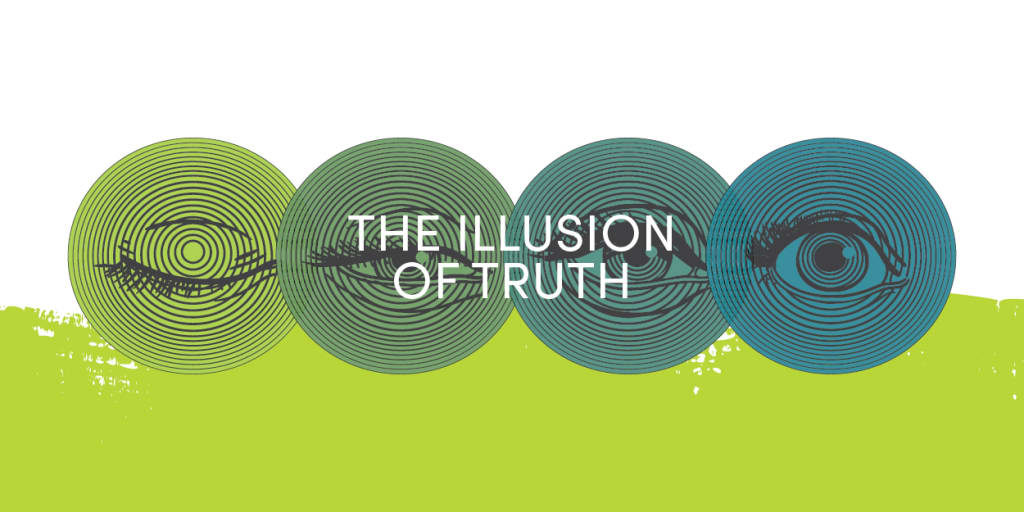The Illusion of Truth
"What is normal for the spider is chaos for the fly"

What is normal for the spider is chaos for the fly. They say the argument of truth is linked to the human experience. But if normal is an illusion, how can we guarantee that the notion of the truth exists? Does one whole truth against 7.753 billion realities? What is the truth exactly? How do we find it? Why is it important? 'Reaching a consensus on an objective description of the world is possible in principle. That is the wonder of science. Consensus on our subjective descriptions is impossible in principle. That is the wonder of consciousness.
Truth is the single currency of the sovereign mind, the knowing subject, and the best thinking – in philosophy, science, and art – discriminates between the objective and subjective sides of the coin and appreciates both the unity of reality and the diversity of experience.'
Socrates, Plato and Aristotle are often referred to as the men who founded the modern approach to the philosophy of the truth. Socrates famously proclaimed he 'knew nothing, as he dared to ask the questions such as 'In what sense are one's claims to knowledge really justifiable?'
According to Psychology Today, there are at least seven approaches to finding the truth:
1. Foundational - made famous by philosopher Rene Descartes, the foundational approach argued that the substance dualist view of matter and mind is "I think; therefore I am." The most obvious systems of the foundationalist approach to the truth are often steeped in logic and mathematics.
2. Coherence - this approach focuses on the way concepts link to one another and build clearly an understandable view of the world. For instance, when one achieves a sense of insight one's perspective shifts, and a number of pieces fall into place.
3. Correspondence - an empirical approach with a focus on data collection, to which developed methods tested or corresponded models generate a hypothesis' that could then be examined to see if the data lines up with the prediction. This approach is that of the Natural Sciences.
4. Phenenomelogical - Immanuel Kant embraced the Phenenomelogical approach, by dividing the world from which we can experience and the thing-in-itself. When we think of data where does it reside? Does it reside in the world or do empirical sense impressions reside in the perspectives of the observers?
5. Pragmatic - American philosophers, William James and Charles Saunders Pierce highlights that the conceptions of truth are being in what works and what is useful to the world in determining what is accurate from the inaccurate while fostering other goals. The search for truth can be conceptualised in terms of goals and utility and thus is contextualised.
6. Social Construction - The linguistic turn in the search of truth or post-structuralists like Micheal Foucault emphasise how truth claims are intertwined with power, influence and social context. Our beliefs are the cultural context, when we are socialised into various systems we then try to justify our truths in relation to other ideas that reside in the context in which we exist. The plurality of different views demonstrates the influence of intersubjective consensus by groups of people having regarded what constitutes the truth.
7. Moral/Ethical/Aesthetic - Philosopher David Hume argued that one cannot derive what ought to be, solely on the basis of what is. This then led to a natural separation into what is and ought to be. However, it is crucial to realise that the separation of the two cannot be so easy. In addition, others argue that goodness and truth are often accompanied, what is beautiful is true. That is ultimate values pertaining to goodness and beauty that are true in how they orient the embodiment of our claims of accuracy.
Others claim the truth is property of fact and logic. I believe it is an illusion. Consider this extract from the Bible:
“Even the Spirit of truth, whom the world cannot receive because it neither sees him nor knows him. You know him, for he dwells with you and will be in you.” (John 14:17).
"You'll know the truth, and the truth will set you free” (John 8:32)
The world has truth, you have your truth, and the people around you have truth also.
In essence, there are many versions of the truth because what 'is' can be interpreted differently by our perception. For example, we could all read the same book and although many of us will agree with some claims of accuracy, we will all have different perceptions of our interpretations based on having our senses perceive our experience. After all, the truth is linked with the human experience.
On the one hand, the truth in its entirety does exist but with limitations. You, I, are proof of this truth. Yet, on the other hand, the truth is based on our interpretations and perceptions. In addition to our beliefs, morals, values and our environment all of which will have an effect on our perception of truth, thus the truth is no more than an illusion steeped in mystery.
It is a chaotic binary of existing and not existing at all. Think Samuel Beckett and you'll get the gist.
Either way, keep your eyes peeled, question everything, and be wary of lies wearing the shield of truth.
References:
https://www.christianity.com/wiki/christian-life/how-do-we-know-what-truth-is.html
https://philosophynow.org/issues/86/What_Is_Truth
https://www.psychologytoday.com/us/blog/theory-knowledge/202009/seven-approaches-finding-the-truth
About the Creator
Rosie J. Sargent
Hello, my lovelies! Welcome, I write everything from the very strange to the wonderful; daring and most certainly different. I am an avid coffee drinker and truth advocate.
Follow me on Twitter/X @rosiejsargent97






Comments
There are no comments for this story
Be the first to respond and start the conversation.